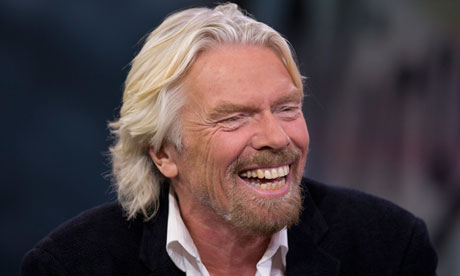Richard Branson didn't like my column about his rail company – but he can't deny that taxpayers are piling up debts to subsidise his profits

Richard Branson. Photograph: Bloomberg via Getty Images
The rich are different from you and me: they hire PR advisers. As night follows day, any criticism of Richard Branson will be met with a fierce counterblast from his troops. So it was last Friday, when a column in Branson's name appeared in the Guardian.
The Virgin boss was displeased with my piece on this page arguing that the hundreds of millions he and his partners made from the West Coast mainline had been handed to them by taxpayers. He wanted to rubbish the thesis, and reassure you that it simply wasn't true. As the headline on his article put it: "Hard work, not handouts, put our trains back on track." And the rather innovative way Sir Richard sought to persuade you of his case was by not addressing the main points and instead kicking up a load of sand.
First, he denied that the "serious money" to buy Northern Rock was fronted up by foreign investors. Tell that to the National Audit Office. In its May 2012 report on the sale of the Rock, the parliamentary auditors laid out the sources of the £772m paid for it. Virgin directly put up £200m; that compares with the £269m chipped in by the US fund manager Wilbur Ross and £50m from a private-equity fund based in Abu Dhabi. The remainder, reports the NAO, was a short-term bank loan "repaid using cash extracted from Northern Rock plc". How this £253m was taken out of the former building society we'll know for sure when the latest accounts are filed with Companies House, but to me it sounds a lot like the asset-stripping that was much talked about at the time. Whatever, my point stands: in the whip-round for buying the Rock, Virgin was not the major contributor.
Then there are the hundreds of millions you and I have given Virgin to run its railway. Branson's response here is particularly tortured: the facts won't allow him to deny receiving huge subsidies, but he does want to deny that our hard-earned money is what made the difference. To do that, he first makes out what a huge risk he took on with the West Coast franchise. Now, I wouldn't want to make out the pre-1997 line as some Elysian pleasure-rail. But you do have to wonder just how rickety this business venture was, given that over its 16 years of business, Virgin trains has only racked up a loss twice: in 1997 and 2006. Over that period, this tremendously precarious enterprise has yielded a pre-tax profit of £674m. The Virgin boss doth protest too much, I think; perhaps to drown out the sound of the cashtills ringing.
Finally, to the point Branson doesn't want us to discuss: the amount we've given to him. Let's go back to the report that prompted my earlier column. A group of researchers based at Manchester University's Centre for Research on Socio-Cultural Change looked at both the openly admitted subsidies (the £9bn-odd paid by us for upgrading the track used by Virgin) and the hidden handouts of train companies paying Network Rail super-low prices to use its lines. Under Railtrack, train operators used to pay £3bn a year in rail-access charges; now that figure has nearly halved to just over £1.5bn. Virgin is the third-biggest recipient of this secret subsidy, paying less in 2012 for using the track than it did in 2004. That is despite having a lovely new line to run on, which allows it to offer a more frequent and lucrative service. Without these subsidies, Branson and co would be in the red. But with them, it is taxpayers who are in the red: Network Rail has a debt of £30bn, which is growing at £5bn a year. This is money that will almost certainly have to be paid back by you and me.
I've said this before, but I have no particular grouse with Branson. I've taken Virgin flights and found them fine; I've also stood on a Virgin train from Rugby onwards, but such is life. I haven't been holding out for an invitation to Necker. But Virgin Rail is merely a player, a lobbyist and a big beneficiary of a terrible system, where Britons hand money to private companies who then claim to be running a profitable business while relying on a subsidy from us. Last week, we read about how the town of Fermanagh prepared for the upcoming G8 summit by sticking posters over its empty shopfronts to make them look bustling. Something similar is going on with the use of public money in the notionally private industry of rail: it's a Potemkin market, nothing more.
Branson's reply is part of a sector's attempt to duck this argument with the aid of bluster and selective facts. And since neither the government nor the train operators want to disrupt these secret handouts or to rip the veil away from our privatised system, it's easier for the press not to probe too deeply.
Yet poll after poll shows the public wants to take the rail network back into national ownership. That's all the more remarkable, given the lack of support from major political parties (it's left to Green MP Caroline Lucas to introduce a private-member's bill calling for renationalisation), and the vacuum in the media where serious discussion of alternatives to the current mess should be. Far easier, I guess, to have a secret £30bn debt with our names on it.

